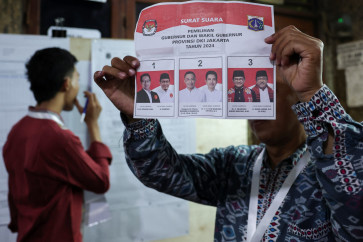Popular Reads
Top Results
Can't find what you're looking for?
View all search resultsPopular Reads
Top Results
Can't find what you're looking for?
View all search resultsBPK slams city's efforts to manage liquid waste
The Jakarta office of the Supreme Audit Agency (BPK) has criticized the city administration's efforts to handle liquid waste, saying they were far from optimal and that 13 rivers in Jakarta were severely polluted with domestic liquid waste
Change text size
Gift Premium Articles
to Anyone
T
he Jakarta office of the Supreme Audit Agency (BPK) has criticized the city administration's efforts to handle liquid waste, saying they were far from optimal and that 13 rivers in Jakarta were severely polluted with domestic liquid waste.
BPK Jakarta head Efdinal said in a press conference recently that the results of BPK's audit on the liquid-waste-handling performance of various agencies showed waste management was ineffectual.
The agencies comprise the Jakarta Environmental Management Agency (BPLHD), the Spatial Planning Agency, the Sanitation Agency, the Jakarta Development Planning Board (Bappeda), the Construction Supervision and Regulation Agency (PPB), the Public Works Agency and city-owned liquid waste management firm PD Pal Jaya.
Efdinal said the agencies lacked legal tools as a basis to work. 'There is no specific bylaw that regulates the liquid waste management system,' he said, adding that the agencies worked based on Gubernatorial Regulation No. 122/2005.
'The regulation, however, does not detail domestic waste treatment systems or clear rewards and punishments for residents,' he said.
Jakarta, home to 10 million people, does not have a centralized sewage system for its grey water (from cooking, bathing and washing) or black water (waste from urine and fecal matter).
The city has only one large sewage system in Setiabudi, South Jakarta, managed by Pal Jaya. However, it can manage only 2 percent of Jakarta's area. BPK Jakarta audit team head Herman Wintyas said there were also 35 communal waste management centers around the city.
'However, this covers less than 1 percent of the total population. Some of the centers are also managed poorly,' he said.
Herman said this lack concern for liquid waste management in Jakarta had greatly affected Jakarta's 13 rivers, as most residents still discharged their liquid waste, especially grey water, into the rivers.
'Not many residents are well informed that the grey water should also be treated before being discharged into the ground or rivers,' he said.
Herman said according to BPLHD data, pollution in all 13 rivers in Jakarta had reached alarming levels.
The 13 rivers comprise the Ciliwung, Pasanggrahan, Cipinang, Angke, Mookervart, Krukut, Kali Baru, Buaran, Tarum Barat, Cakung, Petukangan, Sunter and Grogol.
'The number of coliform [bacteria commonly used as an indicator of water's sanitary quality] in these rivers is far from normal levels,' he said.
The Waste Management Monitoring sub-department head of BPLHD, Rosa Ambarsari, admitted that the efforts of her agency to monitor liquid waste management in the capital city were not optimum.
'We so far only monitor liquid waste management in formal businesses,' she said, adding that her department monitored around 1,800 companies in the capital city.
Rosa said those companies were obliged to submit samples of their liquid waste to have it examined. She said her agency did not monitor liquid waste produced by domestic and small and medium enterprises.
'It is difficult to monitor all the liquid waste management in the country as we are only manned by 20 personnel,' she said.
Industries and commercial areas only contribute 20 percent of river pollution, while the remaining 80 percent is from domestic waste, according to the city's data.
The city and the central government had planned to construct a centralized sewerage system, costing around Rp 70 trillion (US$5.6 billion). However, the project has been in limbo for 15 years.










